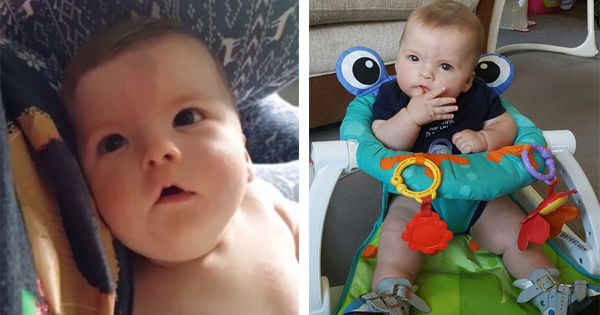Advertisement
Max Bolam was born two weeks early, so many of the slight abnormalities his parents and doctors noticed at his birth were initially brushed off as being a slight delay in development. Everyone assumed he would catch up in a few weeks’ time.
But when Max was six weeks old, and these physical differences still lingered, his parents took him back to the doctor for a re-diagnosis.
Max was born with bilateral talipes, more commonly known as club feet, and was fitted with corrective boots.
His chin was retracted and he had trouble opening his mouth when he cried and breastfed, but the doctors didn’t think these were symptoms of anything more serious.
That was when parents Natalie and Steven asked, directly, whether their son had Moebius Syndrome, a medical condition where the muscles controlling facial expression and eye movement are paralyzed.
Natalie’s father had done some personal research and sent this information to the family, hoping that it would help Max – and it did. “When he showed me what he’d found,” Natalie remembered, “it was like a light bulb [sic] moment.”
After conducting some tests, the doctors confirmed that Max did have Moebius Syndrome.
Max will never be able to smile – unless he undergoes plastic surgery procedures in the future when he’s older. These procedures can’t guarantee that Max will be able to smile, but they may allow him to start forming other expressions.
For Max’s parents, the positive diagnosis was “a little reliev[ing].” It was still hard to accept the fact that their young son would never be able to smile up at them; “it really hurt,” Natalie admitted.
But knowing that they could also stop asking the “‘what if?’ thoughts” was also incredibly reassuring.
Since Max’s diagnosis, his parents have been asked many times, whether Max’s inability to smile affected his ability to laugh.
Thankfully, it doesn’t. Natalie filmed a video recently of Max laughing and reassured everyone that Max “babbles away and he cries and he laughs, just like everyone else. He stares so intently into our faces. He loves to sit and feel all around your face, every inch of it. He also loves to be cuddled.
“Our journey would be so much harder if he didn’t have such a hearty, wonderful laugh.”
You can hear Max’s laugh here:




